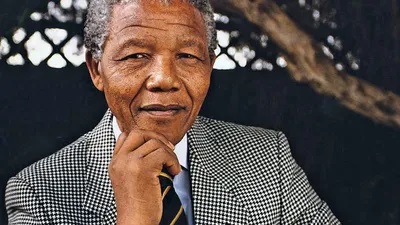Nelson Mandela Palestine: His Quotes, Legacy, and Global Impact

Nelson Mandela palestine
Nelson Mandela Palestine remains one of the most influential figures in modern history. Born in 1918, Mandela dedicated his life to fighting against the systemic oppression of apartheid in South Africa and became a global symbol of resilience, justice, and reconciliation. Remarkable acts of bravery, wisdom, and unyielding commitment to human rights marked his life. This article explores Mandela’s most memorable quotes, his influence on global issues such as Palestine, key facts about his life and legacy, and how he became a celebrated figure worldwide. We’ll also touch on the best movies that encapsulate his life, his impact on the world, and interesting facts about Nelson Mandela Day.
Mandela’s Memorable Quotes
Nelson Mandela Palestine ’s words continue to inspire people globally. Here are some of his most powerful quotes:
- “Education is the most powerful weapon which you can use to change the world.”
- Mandela firmly believed that knowledge was the key to liberating individuals and societies. This quote captures his perspective on how education empowers people to create a better world.
- “I am not a saint, unless you think of a saint as a sinner who keeps on trying.”
- Mandela was known for his humility, emphasizing that he was a human being who made mistakes but strived to do better. This quote underscores his willingness to embrace imperfection and persist in his efforts.
- “It always seems impossible until it’s done.”
- This simple but profound statement is emblematic of Mandela’s life and work. It reminds us that monumental change is achievable even when the odds seem insurmountable.
- “No one is born hating another person because of the color of his skin, or his background, or his religion.”
- Mandela’s fight against racial discrimination was grounded in his belief that prejudice is a learned behavior, and thus it can be unlearned. His quote here resonates deeply in today’s discussions on racism and equality.
- “I have walked that long road to freedom. I have tried not to falter; I have made missteps along the way.”
- Reflecting on his life’s journey, Mandela acknowledges his struggles and imperfections. This quote captures his resilience and commitment to the cause of freedom, despite numerous setbacks.
Mandela’s Support for Palestine
Mandela’s commitment to human rights extended beyond South Africa. He was vocal about his support for Palestine and advocated for a peaceful resolution to the Israeli-Palestinian conflict. In one of his famous statements, he asserted, “Our freedom is incomplete without the freedom of the Palestinians.” Mandela’s stance on this issue underscored his belief that all people deserve freedom, equality, and justice, regardless of their nationality or background.
While he supported a two-state solution and condemned violence on both sides, Mandela’s advocacy for Palestinian rights remains influential among activists and leaders fighting for justice in the region. His legacy has inspired many leaders in Palestine, as well as advocates for peace worldwide, to persist in their pursuit of freedom and equality.
Who Was Nelson Mandela?
Nelson Mandela Palestine was born on July 18, 1918, in the rural village of Mvezo in South Africa. He belonged to the Thembu royal family and was given the name “Rolihlahla,” which means “pulling the branch of a tree” or, colloquially, “troublemaker.” His life reflected the spirit of this name, as he became a major disruptor of the oppressive apartheid regime in South Africa.
Mandela pursued a legal education and became one of the first black lawyers in South Africa. As a member of the African National Congress (ANC), he played a crucial role in mobilizing resistance against apartheid. He co-founded the ANC’s Youth League and later the militant Umkhonto we Sizwe, or “Spear of the Nation,” which marked the beginning of his journey as a revolutionary leader. Mandela’s efforts ultimately led to his arrest in 1962 and a subsequent 27-year imprisonment, primarily on Robben Island.
The Death of Nelson Mandela
Nelson Mandela Palestine passed away on December 5, 2013, at the age of 95. His death was met with an outpouring of grief and remembrance worldwide. World leaders, citizens, and activists across continents mourned the loss of a man who had come to symbolize justice and human rights. His funeral was attended by dignitaries and influential figures from all walks of life, a testament to the impact he had globally.
Mandela’s death marked the end of an era, but his legacy continues to live on. His contributions to freedom and justice remain as relevant today as ever, inspiring new generations to fight for equality, unity, and peace.
Nelson Mandela Day Facts
Nelson Mandela Palestine Day, observed on July 18, was officially declared by the United Nations in 2009. It is celebrated annually to honor Mandela’s life and legacy and to encourage people worldwide to take action to improve their communities. Here are some facts about this special day:
- 67 Minutes of Service: Nelson Mandela Day encourages people to dedicate 67 minutes of service to others, reflecting the 67 years Mandela spent fighting for social justice.
- Global Observance: The day is observed in countries around the world, where citizens are encouraged to volunteer, engage in acts of kindness, and support their communities in honor of Mandela’s legacy.
- Social Impact Projects: On this day, numerous NGOs, government organizations, and private enterprises launch initiatives aimed at education, poverty reduction, and environmental conservation.
The Best Movies About Nelson Mandela
Several films have portrayed Mandela’s life, offering insight into his struggles and triumphs. Here are some notable ones:
- “Invictus” (2009): Directed by Clint Eastwood, this film stars Morgan Freeman as Mandela and focuses on his efforts to unite post-apartheid South Africa through rugby. “Invictus” is an inspiring tale of reconciliation and showcases Mandela’s belief in the power of sports to bring people together.
- “Mandela: Long Walk to Freedom” (2013): Based on Mandela’s autobiography, this biographical drama stars Idris Elba as Mandela. The film covers his life from his early years to his presidency, providing a detailed look at his journey and sacrifices.
- “Goodbye Bafana” (2007): This film follows the friendship between Mandela and his prison guard, James Gregory, highlighting the transformative effect Mandela had even on those who were initially his adversaries.
- “Mandela and de Klerk” (1997): Starring Sidney Poitier as Mandela, this film focuses on Mandela’s relationship with then-president F.W. de Klerk, depicting the complex negotiations that led to the end of apartheid.
Mandela’s Popularity Worldwide
Nelson Mandela Palestine ’s popularity transcends borders and cultures, making him one of the most respected and beloved figures globally. His relentless pursuit of justice and forgiveness earned him admiration worldwide. Here are some reasons for his widespread popularity:
- A Universal Symbol of Freedom: Mandela’s fight against apartheid struck a chord with people globally. His story resonated with marginalized and oppressed communities who saw him as a symbol of hope and courage.
- Advocate for Peace and Reconciliation: Mandela’s commitment to peace, even after enduring years of oppression, made him a beacon of reconciliation. His focus on building bridges instead of harboring resentment set a powerful example.
- Human Rights Advocacy: Mandela’s advocacy extended beyond South Africa, as he championed human rights issues worldwide. His stance on Palestine, support for the anti-apartheid movement, and solidarity with marginalized communities cemented his status as a global advocate for justice.
- Personal Humility: Mandela’s humility and willingness to admit his mistakes only added to his allure. He was never one to boast about his accomplishments, often crediting others and remaining grounded despite his fame.
Interesting Facts About Mandela’s Life
- Sports Enthusiast: Mandela loved boxing and often used sports metaphors in his speeches. He believed sports could bring unity and was instrumental in using rugby to bridge racial divides in South Africa.
- Cultural Influence: Mandela’s life has been celebrated through songs, literature, and art. Musicians like Stevie Wonder and The Specials released songs dedicated to him, and writers worldwide have chronicled his journey.
- A Nobel Peace Prize Winner: Mandela received the Nobel Peace Prize in 1993, an honor he shared with F.W. de Klerk. This award recognized their collective efforts to dismantle apartheid peacefully.
- Love for Gardening: During his time on Robben Island, Mandela took up gardening. His garden became a metaphor for his resilience and ability to create something beautiful despite challenging conditions.
- Inspiration for Generations: Mandela’s story continues to inspire leaders, students, and activists across generations. His legacy has been included in educational curricula globally, ensuring that future generations understand the importance of equality, justice, and resilience.
Conclusion
Nelson Mandela Palestine ’s legacy is one of courage, sacrifice, and boundless hope. His life is a testament to the power of perseverance, the importance of compassion, and the strength found in unity. From his unwavering support for Palestine to his enduring quotes, Mandela left an indelible mark on history and society. Celebrating his legacy on Nelson Mandela Day is a reminder of the importance of selfless service and dedication to social justice. His popularity worldwide underscores the lasting impact of his principles and the inspiration he continues to provide for the fight against inequality and injustice.




